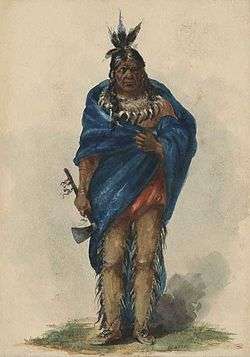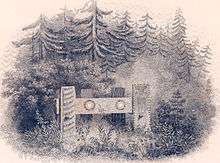Comcomly

Comcomly (or Concomly) (1765 – 1830)[1] was a leader of the Native American Chinookan people. Referred to as "Chief" or "'King" Comcomly in contemporaneous journals,[2] he was the principal leader of the Chinook Confederacy, which extended along the Columbia River from the Cascade Range to the Pacific Ocean.[3]
Washington Irving described him in his book Astoria as "a shrewd old savage, with but one eye," and referred to his trade and diplomacy skills.[3] Modern historian James Ronda characterizes Comcomly as a talented diplomat and shrewd businessman.[4] He was friendly to the British and Euro-American explorers whom he encountered, including Robert Gray and George Vancouver,[5] and he received peace medals from Lewis and Clark.[3] He also assisted the Pacific Fur Company, also known as the Astor Expedition, and offered to help the Americans fight the British during the War of 1812, but Astoria was sold to the British instead.[3] Comcomly was friendly with the British as well.[3] He was entertained at Fort Vancouver by John McLoughlin and he piloted Hudson's Bay Company ships up the Columbia.[3]

Family
Comcomly's daughter Elvamox, also known as Marianne, married Duncan McDougall of the Pacific Fur Company, and after he left she married Etienne Alexis Aubichon, also a fur trader. She was the mother of one son and six daughters.[6] Another of Comcomly's daughters, Raven, also known as Princess Sunday, married Archibald McDonald.[3] She was the mother of Ranald MacDonald.[3]
Descendants
Descendants of Comcomly include Chinook elder and historian Catherine Troeh [7] and United States Ambassador J. Christopher Stevens, who perished in Libya during the 2012 militant attack on the US consulate in Benghazi.[8]
Death
Comcomly died in 1830 when a fever epidemic struck his tribe.[3] His remains were interred in a canoe, per Chinook custom, in the family burial ground.[9] In 1835, Comcomly's skull was stolen from his grave by a Hudson's Bay Company physician and sent to England for display in the Royal Naval Hospital Haslar Museum. Although damaged in The Blitz during World War II, the skull was eventually sent to the Clatsop County Historical Society in Astoria in 1953, and then to the Smithsonian Institution in 1956.[10] In 1972, it was finally repatriated to Chinook tribal members for reburial.[11]
Namesakes
There was a station of the Oregon Electric Railway in Marion County named "Concomly".[12]
References
- ↑ Sheldon, T. "Ilwaco Cemetery Records". Cemetery Records Online. Interment.net. Retrieved 2012-02-01.
- ↑ Henry, Alexander; Thompson, David (1897). Elliott Coues, ed. New Light on the Early History of the Greater Northwest: The Manuscript Journals of Alexander Henry and David Thompson, 1799-1814, Volume II (Hardback). New York: Francis P. Harper. Retrieved May 12, 2014.
- 1 2 3 4 5 6 7 8 9 Cogswell, Jr., Philip (1977). Capitol Names: Individuals Woven Into Oregon's History. Portland, Oregon: Oregon Historical Society. p. 103.
- ↑ Ronda, James P. (1990). Astoria and Empire. Lincoln: University of Nebraska Press. pp. 198–297. ISBN 0-8032-8942-1.
- ↑ Floris, Beryl Marjory Brown (1980). Elvamox: Memories of a Pacific Northwest Family. Nevada City: John Balogh Floris. p. 7.
- ↑ Floris, Beryl Marjory Brown (1980). Elvamox: Memories of a Pacific Northwest Family. Nevada City: John Balogh Floris. p. 72.
- ↑ Kamb, Lewis (2003-12-12). "Roommates discover a bond going back to Lewis and Clark". The Seattle Times. Retrieved 2007-07-25.
- ↑ Jenni Monet (2012-09-28). "Ambassador J. Christopher Stevens' Mother Spells Out Family Legacy". Indian Country Today Media Network. Retrieved 2012-09-29.
- ↑ Mussulman, Joseph. “Chief Comcomly's Tomb”, ‘’Discovering Lewis and Clark’’. Retrieved on 2008-07-13.
- ↑ Stewart, Thomas Dale (1960). The Chinook Sign of Freedom: A Study of the Skull of the Famous Chief Comcomly. Washington: Smithsonian Institution. p. 20.
- ↑ Schodt, Frederik L. (2003). Native American in the Land of the Shogun: Ranald MacDonald and the Opening of Japan. Berkeley: Stone Bridge Press. ISBN 1880656787.
- ↑ McArthur, Lewis A.; McArthur, Lewis L. (2003) [1928]. Oregon Geographic Names (7th ed.). Portland, Oregon: Oregon Historical Society Press. ISBN 978-0875952772.
External links
- Comcomly (1760s?-1830) at HistoryLink
- Leadership from trailtribes.org includes The Succession of Comcomly
- Drawing of Comcomly's tomb from lewis-clark.org
